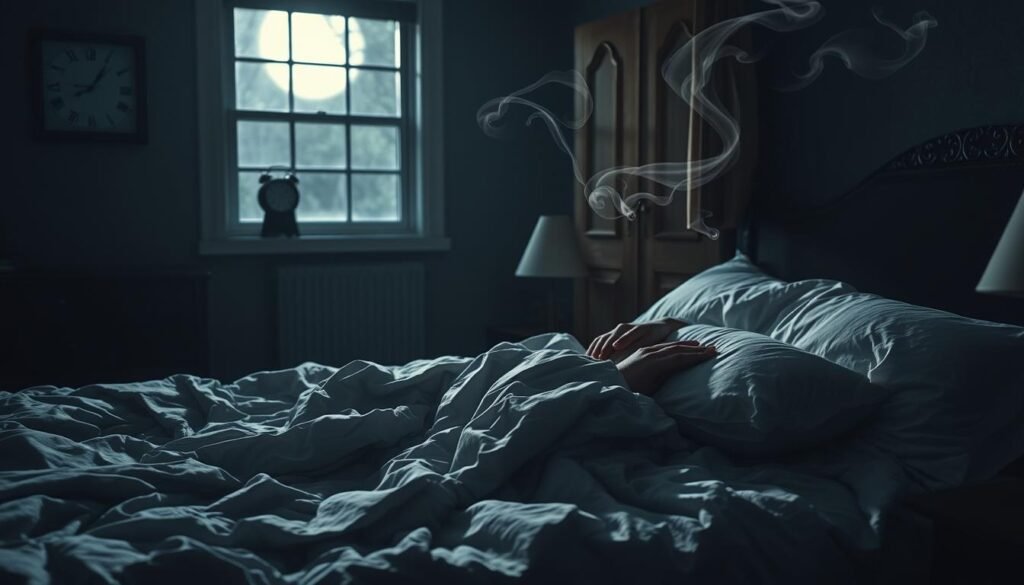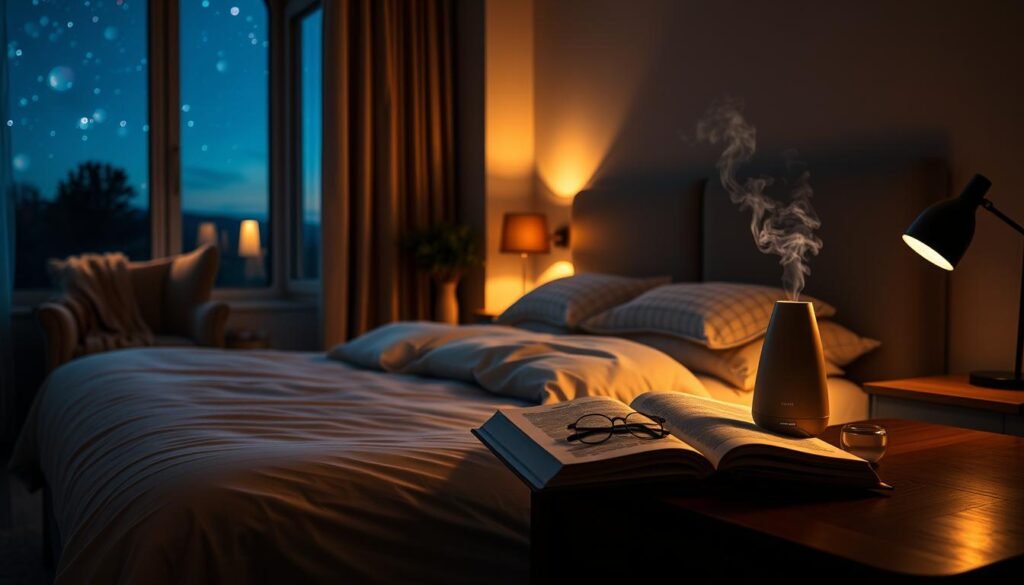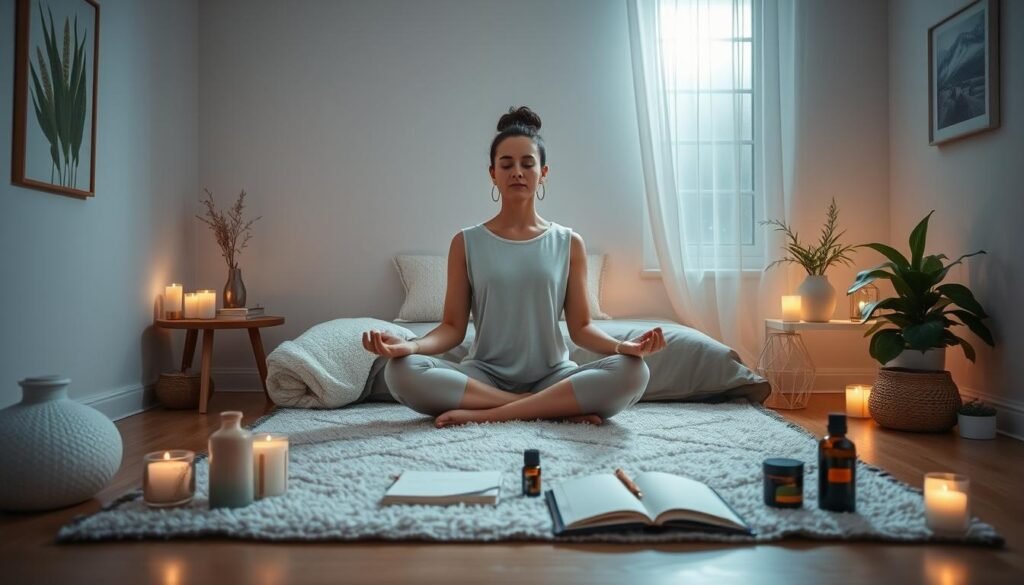About 40 million adults in the U.S. struggle with anxiety yearly. This fact sheds light on a big issue. Many feel extreme stress, especially at night. Nighttime anxiety can mess up how well we sleep and our overall health. But, we can fight back with certain strategies to make nights better.
We aim to share tips to handle night time anxiety. This will help you sleep better and feel better. We’ll look at ways to relax, set night routines, and how changing habits can ease anxiety. Through this article, you’ll get the tools to fight sleepless nights. We’ll explore how to deal with anxiety and find peace before sleeping.
Key Takeaways
- Anxiety disorders are the most common mental illness in the U.S., affecting around 40 million adults.
- Implementing consistent sleep patterns can help regulate circadian rhythms vital for addressing night time anxiety.
- Techniques such as deep breathing and mindfulness can offer effective anxiety relief.
- Weighted blankets and sound machines may help create a calming sleep environment.
- Seeking professional help, such as through cognitive behavioral therapy, can greatly improve anxiety symptoms.
Understanding Night Time Anxiety
Night time anxiety affects many people. It often comes from stress and personal experiences. Knowing the causes of night time anxiety is key to managing it. At night, when things get quiet, our minds can focus on worries. Not getting enough sleep can make anxiety worse. This can make it hard to both sleep well and feel mentally healthy.
Causes of Night Time Anxiety
Many things can cause sleep anxiety. They usually include:
- Life Stressors: Problems at work, sickness, or losing someone can lead to temporary anxiety. This may turn into an anxiety disorder.
- Traumatic Experiences: Bad events, like violence or natural disasters, can cause more anxiety. This is especially true if those events happened in childhood.
- Genetics: Some people are more likely to feel anxious after stressful events because of their genes.
- Medication Side Effects: Some drugs, like steroids and stimulants, can make some people feel anxious.
How Night Time Anxiety Impacts Sleep
Night time anxiety hurts sleep quality. When there are no day distractions, worries grow. This can lead to insomnia. Anxiety can make you feel restless, increase your heartbeat, and cause nightmares. These issues mess with your sleep. Stress makes it hard to get enough REM and deep sleep.
It’s important to understand sleep anxiety to manage it right. People dealing with it often face panic attacks at night. It’s crucial to tackle these problems. Practices like breathing techniques and therapy can help ease anxiety and sleep troubles.
| Factor | Impact on Night Time Anxiety |
|---|---|
| Life Stressors | Can lead to temporary distress and anxiety disorders. |
| Trauma | Increases vulnerability, especially if experienced in childhood. |
| Genetic Predisposition | Makes individuals more susceptible to anxiety after stress. |
| Medication | Some substances can induce anxiety symptoms. |
Common Symptoms of Night Time Anxiety
Understanding symptoms of night time anxiety is crucial. It helps people pinpoint their issues and act accordingly. One common symptom is ongoing worry about what will happen in the future. This worry makes calming down at night tough. People may feel restless, struggling to get comfortable or drift off to sleep.
Emotional upset often leads to physical signs. Muscle tension, headaches, and stomach problems are common. Individuals might also have a fast heartbeat. They could feel short of breath, dizzy, sweat, or have tingling feelings. These sensations make falling asleep tough.
Nocturnal panic attacks can be very scary. These attacks may wake someone suddenly, causing sweat, shaking, and a fear something bad will happen. Often, those with night attacks also have them during the day. This shows anxiety doesn’t stop, even at night. Though these attacks are brief, they leave people rattled, making it hard to relax again.
Using anxiety tips can improve the situation. Knowing what signs to look for helps people manage better. Tips include making the bedroom tranquil, not obsessing over time at night, and trying relaxation methods when nighttime anxiety hits.

How Night Time Anxiety Develops
Night time anxiety usually starts with daily stress and ongoing worries. This situation often leads to both anxiety and insomnia feeding into each other. Trying to sleep but failing makes people anxious about not resting. This makes their unease even worse.
The Vicious Cycle of Anxiety and Insomnia
In the U.S., over 20 million people sometimes have trouble sleeping. Anxiety and sleep problems are closely connected. Poor sleep can make anxiety worse, and feeling very anxious can make it hard to sleep. Those with general anxiety may feel restless, have muscle pains, and get headaches, making it hard to sleep well.
Having panic attacks at night makes things even harder, causing fears like feeling choked or dizzy. Stress plays a big role in night time anxiety. It comes from both genes and our surroundings. Sleep problems can also occur with anxiety disorders, including OCD and panic disorder, adding to the struggle.
When sleeping patterns are off, anxiety can get worse. This may lead to more serious mental health issues like anxiety and depression. Setting a good sleep schedule, creating a restful atmosphere, and using relaxation methods can help. It’s key to understand how anxiety and insomnia are linked to break this tough cycle.
Effective Relaxation Techniques for Anxiety Relief
Managing night time anxiety can feel tough. But, using effective relaxation techniques can truly make a difference. They help ease the mind and lessen body tension. This leads to better sleep. Deep breathing exercises and progressive muscle relaxation are especially helpful.
Deep Breathing Exercises
Learning deep breathing for anxiety is key. Techniques like 4-7-8 breathing and box breathing help lower stress levels. They slow down the mind and bring peace. With daily practice, these techniques become easier to use when stressed.
Progressive Muscle Relaxation
Progressive muscle relaxation goes a bit deeper. It involves tensing and then relaxing different muscle groups. This method reduces physical stress and helps you understand how relaxation feels. Regular practice lets you recognize true relaxation, which can be hard to notice in daily life.
Adding relaxation techniques like these to your routine brings many benefits, like better overall health and easier anxiety management.
| Relaxation Technique | Key Benefits | Frequency Recommended |
|---|---|---|
| Deep Breathing | Reduces stress, enhances calmness | Daily practice or as needed |
| Progressive Muscle Relaxation | Increases awareness of tension, promotes physical relaxation | Daily practice for best results |
| Mindfulness Techniques | Improves focus, aids in managing anxiety | Several times a week |
Establishing a Consistent Nighttime Routine
Having a consistent night routine is key for good sleep. It helps people with nighttime stress relax before bed. Doing calm things like reading, writing, or taking a warm bath lowers stress hormones. These actions get your brain ready for sleep.
A bedtime routine includes the same steps each night for an hour or so before bed. It fights anxiety and improves sleep habits. Having a regular sleep and wake time lets your brain know when to rest. It’s important to avoid screens before bed because their light blocks sleep hormones.
Creating a good sleep environment is also vital. Make your bedroom quiet, cool, and dark. Use smells that relax you to boost the mood. Adding deep breaths and mindfulness can make you less tense and improve how well you sleep.
Here are some top actions for a great nighttime routine:
| Activity | Benefit |
|---|---|
| Reading | Helps you relax and forget stress. |
| Journaling | Clears your mind by organizing thoughts. |
| Warm Bath | Helps your body cool down, making it easier to sleep. |
| Calming Music | Makes you more relaxed and improves sleep. |
| Aromatherapy | Uses soothing scents to help you relax. |
Changing to a better routine needs patience. Stick with these habits to sleep better. Start slowly and change one habit at a time to beat nighttime stress. Looking for more advice on sleeping well with anxiety? Check out some expert tips here.

Mindfulness Practices to Combat Night Time Anxiety
Mindfulness practices are key to managing night time anxiety. They help people deal with their worries and get better sleep. These techniques improve mental and physical health, making it easier to chill out before bed.
Meditation Techniques for Better Sleep
Meditating before bed can really help with night time anxiety. It uses different methods to make your mind calm. Regular meditation makes you more aware and sleep better. The 4-7-8 breathing technique is a great way to relax. You breathe in for 4 seconds, hold it for 7, and exhale for 8. This helps calm your mind and gets your body ready to sleep.
Yoga nidra is another great practice for night time. It helps you deeply relax and gets you ready for sleep. Letting go of body and mind tension leads to much better sleep.
To see the best outcomes, make these practices a regular part of your routine. Doing them often makes them work better. Also, try to use your phone or computer less before bed. Too much screen time can make anxiety worse and mess with your sleep.
Thinking about what you’re thankful for and focusing on happy thoughts can also help. Using mindfulness in these ways fights off night time anxiety well. It leads to a more peaceful and restful night’s sleep.

The Role of Exercise in Coping with Anxiety
Exercise is key for coping with anxiety. Doing activities like walking, jogging, or yoga boosts mood and lowers stress. The U.S. Department of Health suggests adults get 150 minutes of moderate activity weekly. This goal helps in not just relieving anxiety but also in enhancing mental health.
Regular exercise has been shown to lessen anxiety and depression. People who exercise regularly tend to feel less anxious. This is compared to those who don’t. Even short activities, like using stairs, can help improve mood and wellbeing. It makes people feel more confident and at ease with their exercise routines over time.
Some find certain exercises, like high-intensity workouts, particularly helpful. These activities can be as effective as medicine in reducing anxiety. Starting an exercise plan means setting achievable goals and choosing fun activities. This helps people stick with their exercise routine.
It’s wise to talk to a doctor before starting new exercises. This ensures the activities are safe and right for you. Overall, regular exercise not only makes you feel better but also offers emotional benefits. It plays a vital part in managing anxiety well.
For more information on the benefits of physical activity for anxiety, visit this site about exercise’s role in stress. Learn about different exercises for fighting anxiety at Mood Care Health.
Seeking Professional Help for Persistent Night Time Anxiety
Getting help for night time anxiety is very important. Many suffer from a cycle that ruins sleep and peace of mind. Mental health support is key in overcoming these troubles effectively.
Therapy, like cognitive behavioral therapy (CBT), is great for anxiety. It helps people change negative thoughts and behaviors. With a therapist’s guidance, one learns to handle anxiety better.
Medication might be necessary too. Antidepressants and anti-anxiety drugs can help ease symptoms. Finding the right treatment involves talking openly with doctors. This builds a trusting relationship where you can share your feelings and experiences.
Before seeing a doctor, it’s good to prepare. Note down how anxiety affects you, what causes stress, and your family’s mental health history. This information helps doctors create a tailored treatment plan for you.
In short, if self-help isn’t enough, seek professional anxiety help. Working with mental health experts, you can find effective treatments and medications. This leads to better ways of dealing with anxiety and improving your sleep.
Healthy Lifestyle Changes to Reduce Night Time Anxiety
Making healthy lifestyle changes can greatly reduce night time anxiety. Your diet is key in this fight. By changing what you eat and how you eat, you can sleep better and calm your mind.
Nutrition Tips for Better Sleep
Good nutrition is vital for easing anxiety symptoms and improving sleep. Foods high in melatonin, like tart cherries, help with sleep patterns. Eating protein in the morning keeps you full and balances blood sugar. Also, whole grains boost serotonin in the brain, which calms you down.
- Omega-3 fatty acids found in fish, such as salmon, may improve mood and contribute to better mental health.
- Ensure proper hydration, as mild dehydration can negatively affect mood and increase anxiety.
- Emphasize whole, unprocessed foods to avoid physical reactions that may lead to irritability and anxiety.
Reducing Caffeine and Alcohol Intake
Lowering caffeine and alcohol is key to less night time anxiety. Caffeine can make you jittery and more nervous, making anxiety worse. High caffeine levels have been linked to panic attacks in those with anxiety issues.
Though alcohol might seem relaxing at first, it actually makes you more anxious later. Try to drink less, especially four hours before sleeping. This helps you sleep better.
| Foods/Drinks | Effect on Anxiety | Recommendations |
|---|---|---|
| Tart Cherries | High in melatonin, promotes sleep | Incorporate in evening snacks |
| Salmon | Rich in omega-3s, improves mood | Include in weekly meals |
| Hydrating Beverages | Helps maintain mood stability | Drink throughout the day |
| Caffeine | Increases anxiety and jitteriness | Avoid at least 4 hours before bed |
| Alcohol | Initial relaxation, later increases anxiety | Limit intake, especially at night |
Conclusion
Overcoming night time anxiety needs a full plan. This includes knowing what causes it, spotting symptoms, and using good relaxation methods every day. Using deep breaths and setting a calm night routine can help take back sleep. This boosts overall health.
Making lifestyle changes is also key to reducing anxiety’s effect on sleep. It’s vital to watch our habits, like cutting down on caffeine. About 85% of Americans drink coffee daily. Knowing how anxiety and poor sleep are linked is crucial. Not sleeping enough can make anxiety worse. This creates a tough cycle to break.
If night time anxiety keeps bothering you, getting help from a mental health pro is a great step. This can lead to sleeping better and managing anxiety well. Relaxation methods and learning about sleep’s science can greatly improve mental health. For more on how this works in the brain, you can read up on it here.